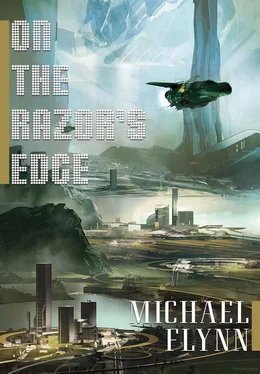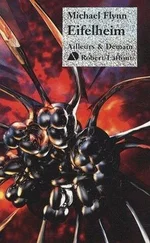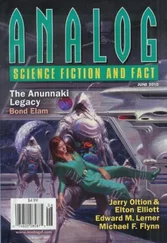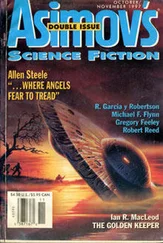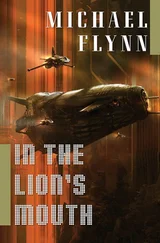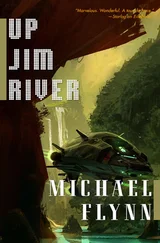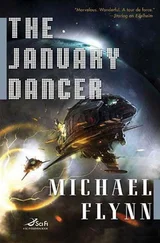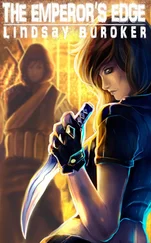The scarred man sat at the bar, feeling unnaturally exposed. He disliked putting his back to an open room, but there was a mirror behind the bar into which was etched the recumbent blue body of Sleeping Bisna, who was here called “Vishnu.” It gave him a view of his six. There were few townsmen in the bar. The farmers, the bartender promised him, would return at sunset, and then the joint would get “jumpy.”
“Though I wouldn’t let on you be from the Diaspora,” he was advised; and the others nodded in chorus, offering grave assent. “Most of the clodhoppers are tolerant, but there are a few in every crowd. You know how it goes.”
Donovan agreed that he knew how it went. The Terrans of New Bramburg spoke not the Tongue. A few words and phrases of the old Taņţamiž peppered their talk but seemed more decorative than substantive. For the most part, the Folk had acquired the clothing and the accents of Old Eighty-two. Blue eyes and fair skin were common among them, and while they were conscious of having lived in this place longer than death, they were less aware that matters now were very different from when their ancestors had flourished.
Donovan bought a round for the house. That custom, at least, had not changed, and for a time he basked in a companionable silence. The shopkeepers and service techs who comprised the daytime population asked him desultory questions. How fare the Terrans of the Periphery? They were not really interested. The Periphery might as well be in the Andromeda Galaxy for all it mattered to them. But they sighed to hear of worlds where Terrans were merely snubbed and not subject to periodic murderous spasms. Life, they thought, must be wonderful in the Terran Corners of Jehovah and Die Bold and Dancing Vrouw.
“Not that we’d speak unfaithfulness to the Names,” the bartender reminded everyone, eliciting a chorus of grunts and “of course not.”
“Although,” the Fudir said, “it was the Names who cleansed Old Terra.”
“Mighty are the Names,” agreed the bartender. But one or two patrons twisted their lips in skepticism.
“One hears,” ventured the Vendor of Approved Pesticides, “other tales.”
“That the prehumans—the People of Sand and Iron—wrought the deed?” suggested the Fudir.
“There are stories.” The Vendor agreed without actually agreeing.
“Though to say so,” added the bartender, “were to disparage the might of the Names.”
The Terrans of New Bramburg all looked at Donovan without turning their heads. Who knew how long a tongue a stranger might have that it could lick the ears of others?
“I have seen a mobile, a khinyo, of the fall of the Borneo Beanstalk,” the Fudir told them. “And it fell of itself.”
“Nonsense,” said the bartender. “The Names scythed them down.” The Old Terrans, at least, had not forgotten the old lore.
“With monstrous cannon they cut the stalks,
And the roots dried up and the petals fell.”
The Vendor shrugged. “Or the People of Sand and Iron did so and the Names reaped where the prehumans had sown. What matter to such as us?”
The others sucked in their breaths. But the Vendor was undeterred.
“Will you inform on me, O Khenrik Jal? Or you?” He turned to the next stool over. “Or you, Jemdar Smidt, my cradle-companion? What do these sword cuts mean…” He fingered the scar on his cheek. “… if they do not mean we may trust one another? As for this man…” He tossed his head at the Fudir. “… he has the accents of the Periphery in his breath. He might more fear our tattling than we his.”
“Neither was it the prehumans,” insisted the Fudir. “The towers were derelict long before they fell, and they fell because they were no longer maintained. The world had grown too poor and too sparsely filled to support them. I know that two fell in this wise—at Kenya and at Borneo—and I think the other ten as well.”
“Perhaps the Names knocked down the remnants,” said the bartender, salvaging some puissance for the rulers of the Central Worlds. But it occurred suddenly to Donovan buigh that the Old Names may have done so from mercy, dismantling the surviving Beanstalks before they too could topple uncontrolled. It might not be wise to judge the early Names by the decadence of their epigones. If he had learned anything during his hajj, it was that the end of an age might differ vastly from its birth.
“The Commonwealth,” said the Keener of Blades, dropping his voice to a habitual whisper when naming the old regime, “would never have permitted such decay.”
“Maybe not,” the Fudir agreed. “But permission was not in it. The Ice had begun by then, and the farmlands dried up and the growing season shrank. And ‘many young men of twenty went away.’”
“There is a song,” admitted the Keener.
The Vendor’s cradle-companion scratched his cheek. “That one?”
“How runs the lay?” asked the Fudir.
The Keener looked about the room quickly, then lowered his head as the others crowded close to hear. It was a lively, bouncy tune for a matter so poignant.
“The Ship she lifts in half an hour to cross the starry heavens.
My friends are left behind me now with grief and sorrow leavened
I’m just about to slide away in the liner Kat’kutirai
It’s disengaged and the hatch is sealed, I’m leaving dear old Terra.”
The others joined in on the chorus.
“And it’s good-bye, Krish, and good-bye, Chang, and good-bye, Mumbai Mary.
She’s disengaged and the hatch is sealed, I’m leaving dear old Terra.
And now the Alfvens’ grabbing space, I have no more to say.
I’m bound for the Periph’ry, boys, a thousand lights away.
“Then fare you well, old Terra dear, to part my heart does ache well.
From old Kamchatka to Cape Fear, I’ll never see your equal.
Although to half-formed worlds we’re bound where wild beasts may eat us
We’ll ne’er forget the Holy Ground—the daal and beans and taters.
“And it’s good-bye, Krish…”
The bar patrons tittered nervously among themselves when they had finished and two of them glanced once more behind them in case anyone had entered the bar and heard. But it was what the Fudir had not heard that interested him. He had heard no hint of coercion in the song. No indication that the departure had been anything but voluntary. Yet the legends on the Old Planets were that the Dao Chettians had defeated Terra, scythed the Beanstalks, and herded her people onto the Ships of Exile—to be dumped ill prepared on the barely terraformed worlds of the Periphery.
“What if,” he said, as much to himself as the others. “What if the Cleansing took centuries? What if ships began to leave as the world dried out, and it was only at the very end that the Names—or the prehumans—forcibly removed the excess.” An excess that the world could no longer support?
“They sent them to the Periphery to die,” said the Vendor.
“But if the arable land was shrinking, so was Terra’s carrying capacity. To leave them here would leave them to die.”
“Then at least they would have died at home,” said the bartender, surprising the Fudir with unlooked-for outspokenness.
Jemdar Smidt shook his head. “What matter? Others came, and now they too are leaving. We will not see again Terra as she was: bountiful with green, warmed by hot breaths of zephyrs, when only ‘mad dogs and Englishmen went out in the noonday sun.’”
“I’ve always wondered,” the bartender, Khenrik Jal, mused, “what was an Englishman?”
“A native of the Brythonic Isles,” the Fudir told them. “Islands now swallowed by the Ice. This land of yours was called Vraddy.”
Читать дальше
